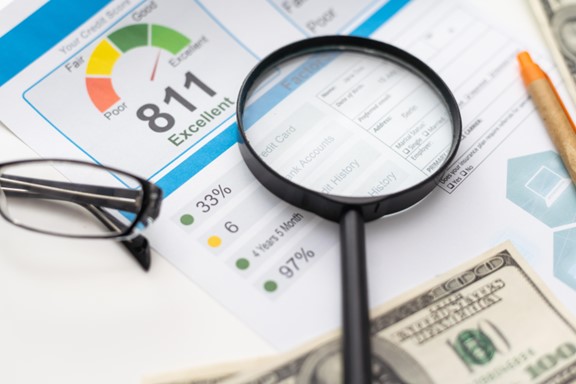Published May 8, 2024 • 7 Min Read
A good credit score is crucial to your financial wellbeing and success. But many young people and newcomers to Canada may be unfamiliar with the concept of a credit score and why it matters.
Here are the basics on what a credit score is, how it works, and how you can build and maintain a strong credit score for the future.
What is a credit score?
Simply put, your credit score is a numeric snapshot of your spending history. It captures important elements of your credit report, like payment and credit history, the amount of credit you use, and whether or not you’ve historically paid your bills in full and on time.
Your credit score is a three-digit number calculated by Canada’s two main credit bureaus — Equifax and TransUnion — to assess your creditworthiness. The higher the score, the more likely you are to get approved for credit, loans, and other financial aspects of life such as renting an apartment.
What is a good credit score in Canada?
In Canada, credit scores range from 300 to 900, with 900 being the very best. A credit score between 740 and 799 is considered very good, while 800 and above is considered excellent.
Why is it important to have a good credit score?
A good credit score shows you’re likely to manage your finances well and pay your bills on time. Banks, credit card providers and auto dealers look at your credit score to determine whether they’re willing to lend you money, how much, and at what interest rate. Before deciding to let you rent an apartment or house, landlords may ask to run a “credit check” on you to ensure you have a good track record of making your payments on time. With your consent, some employers may also request a credit check before making hiring decisions.
Along with being a potential deciding factor on whether you qualify for a mortgage, personal loan, line of credit, or credit card, a strong credit score can also afford you some nice perks. For instance, it may allow you to negotiate better terms like lower interest rates on borrowed money, higher credit limits on credit cards, and even savings on your cell phone plan.
How to increase your credit score
If your credit score is lower than you’d like it to be, there are few simple steps you can take to increase it.
Build your credit history
The surest way to increase your credit score is to maintain a good credit history — and many factors go into this. Each time you borrow money from a lending institution or pay a bill, information on your credit use, repayment history, late payments, and outstanding balance gets shared with the credit bureaus over time. All of these details make up your credit history.
Improve the factors negatively impacting your credit history
A simple way to improve your credit history is to pay your bills on time each month. Even if you can’t pay off your balance in full, paying at least the minimum payment on time each billing cycle helps you build a track record of consistent payments. Over time, these habits will be reflected in a higher credit score.
Pay attention to your credit utilization ratio
You should also pay attention to what percentage of your available credit you’re using each billing cycle. This is called your credit utilization ratio, and using too much of it can have a negative impact on your credit score. Ideally, you want to keep your usage under 35 percent of your total credit limit across all credit products. For example, if your credit card limit is $3,000, aim to spend under $1,050 each billing cycle.
Practice good credit score maintenance
Maintain a good credit score by knowing the factors that affect it and applying this knowledge. These include a solid payment history and low credit utilization ratio, as well as diversifying your credit mix (credit card, auto loan, mortgage) and limiting the number of credit checks (hard inquiries) performed by lenders on your account. Hard inquiries are performed only when you apply for additional credit. Keeping those requests to a minimum may help improve your credit score.
What to do if you don’t have a credit history
If you’re a young person with no credit history yet, you can start by applying for a credit card and using it responsibly. This means paying your bill on time each month, keeping your debt at a minimum, and staying within a reasonable credit utilization ratio. This will become important later in life when you want to, for example, rent an apartment or buy a new car.
Newcomers to Canada are typically unable to carry over their credit history from one country to another, so they must start building their Canadian credit history from scratch. You can start by applying for a Canadian credit card and, again, using it wisely. With time, patience, and good credit habits, you can build a solid credit history, which can increase your credit score as you become more established in Canada. For more guidance and tips on building your credit history in Canada, click here or speak to an RBC Newcomer Advisor.
Why do your credit scores change?
Credit scores can change or fluctuate over time depending on your financial activity. This is normal. The longer you’ve had credit, the more information there is for a lender to see. Over time, good payment history and low credit utilization can add points to your credit score — and missed or late payments can subtract points from your score.
Why are there different credit scores?
Credit scores may also differ. This too is normal and occurs for various reasons. Generally, each score is built on slightly different factors depending on its intended purpose. Some lenders may incorporate information on mortgage or cell phone payments, while others may not. Additionally, some lenders report to both credit bureaus while others may report to only one.
How to check your credit score
Part of keeping a healthy credit score is checking it every now and then, as well as reporting any errors that could have a negative impact on it. You can check your credit score for a fee through either of the Canadian credit bureaus Equifax or TransUnion.
If you are an existing RBC Online Banking credit, you may be able to access your credit score for free through our online banking portal.
Does checking your credit score lower it?
You don’t have to worry about lowering your credit score by checking it. Checking your own score is considered a “soft inquiry” and will not have a negative impact on your credit score.
Your credit score can affect so many aspects of your life — your finances, employment, and even your housing. It’s important to practice good credit score maintenance, as it will open many financial doors that contribute to your overall wellbeing. Take care of your credit score, and it will take care of you.
Interested in seeing what your current credit score is? RBC Online Banking customers can access a free credit report here.
This article is intended as general information only and is not to be relied upon as constituting legal, financial or other professional advice. A professional advisor should be consulted regarding your specific situation. Information presented is believed to be factual and up-to-date but we do not guarantee its accuracy and it should not be regarded as a complete analysis of the subjects discussed. All expressions of opinion reflect the judgment of the authors as of the date of publication and are subject to change. No endorsement of any third parties or their advice, opinions, information, products or services is expressly given or implied by Royal Bank of Canada or any of its affiliates.
Share This Article






